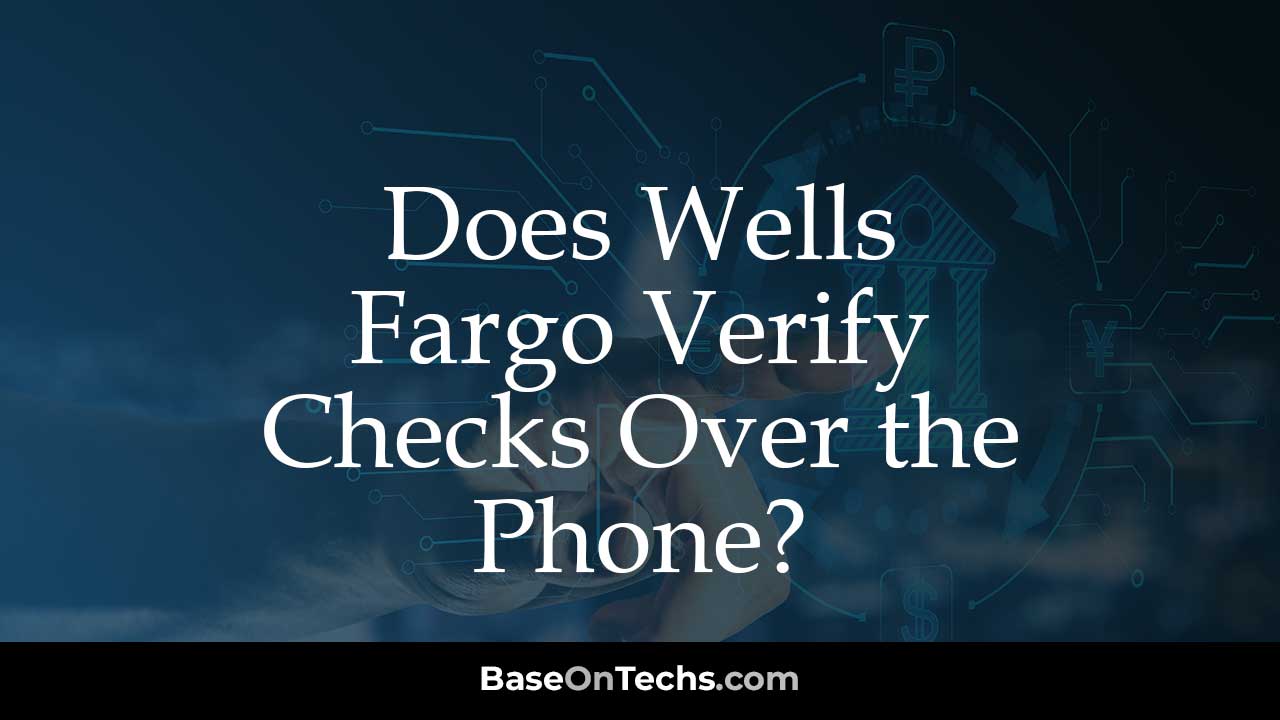Does Wells Fargo Verify Checks Over the Phone?

Does Wells Fargo Verify Checks Over the Phone?
Yes, Wells Fargo verifies checks over the phone. This article will delve into the details of this service and uncover what you need to know about verifying checks with Wells Fargo.
When it comes to managing your finances and ensuring the validity of checks you receive, it’s crucial to have a reliable method for verification. Wells Fargo, one of the prominent banks in the United States, offers a phone-based check verification service to assist its customers in confirming the authenticity of checks they receive.
How Does Wells Fargo Verify Checks Over the Phone?
If you find yourself holding a check and want to verify its legitimacy, you can do so by contacting Wells Fargo’s dedicated phone line for this purpose. To initiate the check verification process, dial 1 (800) TO – WELLS (1-800-869-3557).
Make sure you have:
1. The check number: This is typically found in the upper-right corner of the check and is a unique identifier for that specific check.
2. The account number of the person who wrote the check: This is crucial for verifying whether the check is linked to a legitimate Wells Fargo account.
3. The amount of the check: Providing the check’s exact amount is essential for confirmation.
4. The date of the check: The date when the check was issued is another vital piece of information to ensure accuracy in verification.
Once you’ve furnished these details, a Wells Fargo representative will assist you in determining whether the check is valid and if it originates from a genuine Wells Fargo account.

Important Considerations
1. Funds Hold: Even if a check is verified as legitimate, Wells Fargo may place a hold on the funds from the deposited check for up to 7 business days. This precautionary measure is in place to prevent fraud and ensure the check clears properly.
2. Verification Fees: Depending on the type and amount of the check, Wells Fargo may charge a fee for its verification service. Keep in mind that these charges might be different.
3. Limited to Wells Fargo Customers: Wells Fargo’s check verification service is primarily designed for Wells Fargo customers. If you’re not a Wells Fargo account holder, you might need to explore other options for check verification.
Why Is It Important to Verify a Check?
1. Counterfeit Checks: These are checks that have been forged or created without the account holder’s permission.
2. Non-Sufficient Funds (NSF) Checks: These checks are written against an account with insufficient funds to cover the check’s amount, which can lead to bounced checks and financial complications.
3. Stolen Checks: Checks that have been stolen, whether from the account holder or the mail, can be fraudulently cashed or deposited by thieves.
By verifying a check before accepting or depositing it, you reduce the risk of falling victim to these types of fraud, which could result in financial losses.
When Should You Verify a Check?
It’s advisable to verify any check you receive from someone you don’t know well, whether it’s from a business, organization, or individual.

How to Verify a Check
1. Call the Bank That Issued the Check: This method involves reaching out directly to the bank that issued the check. You’ll need to provide the same essential information mentioned earlier, including the check number, account number of the check writer, check amount, and check date.
2. Use a Check Verification Service: There are various check verification services available, often for a fee. These services streamline the process by contacting the issuing bank on your behalf to verify the check’s authenticity.
3. Visit the Bank in Person: If you prefer physical interactions, you can visit the bank in person to verify a check.
What to Do If a Check Is Fraudulent
1. Contact Your Bank: Reach out to your bank as soon as possible and inform them of the fraudulent check.
2. Report the Fraud: File a report with your local law enforcement agency to document the fraudulent activity.
Conclusion
Verifying checks is a vital aspect of financial responsibility and security. Wells Fargo offers a phone-based check verification service to assist its customers in confirming the legitimacy of checks they receive.
Now, remember that verifying checks helps protect you from various forms of check fraud, including counterfeit checks, NSF checks, and stolen checks. You should verify any check you receive from an unfamiliar source or for a significant amount of money.
